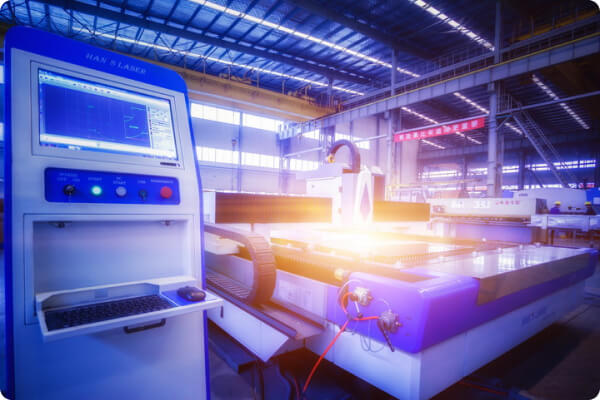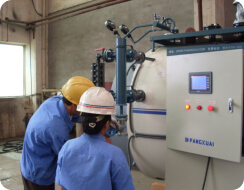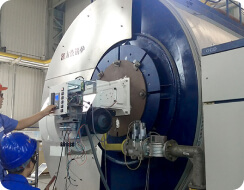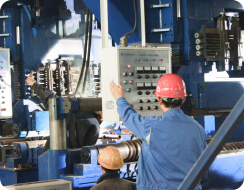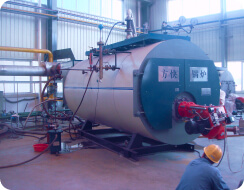The new Ultraten technology heat exchange element wing tube is highly energy-efficient, and the highly advanced condensation technology ensures the efficient use of energy. The flue gas is rapidly cooled, so that the energy can be effectively utilized, saving energy and improving efficiency.

CFD numerical simulation analysis
Apply CFD numerical simulation analysis technology to optimize the heat transfer performance of Ultraten technology heat exchange tubes.

The heat exchange area is increased by 5 times
Increasing the heat exchange area by a factor of 5 can displace more heat in the flue gas, thereby improving the efficiency of heat transfer.

Aluminum silicon alloy
The use of aluminum-silicon alloy heat transfer elements with high thermal conductivity greatly prolongs the service life of the pressure components.

Heat transfer elements deep into the center of the flue gas
The heat transfer element penetrates deep into the center of the flue gas to rapidly reduce the flue gas temperature.

Unique tear groove
The unique tear groove design greatly improves the heat transfer performance of the heat exchange tube in the condensing state.
 Threaded smoke pipe
Threaded smoke pipe
 Wing tube
Wing tube
A new type of environmentally friendly combustion method, which mixes air and gas evenly, burns quickly and thoroughly, and stirs evenly to make the mixing more complete. Fangkuai Boiler grasped the pulse of the times and followed the concept of environmental protection, and launched a fully premixed ultra-low nitrogen gas boiler with NOX emissions below 9ppm, far lower than the requirements of the "Beijing Boiler Air Pollution Emission Standard" published in Beijing.
In this combustion method, the gas is fully burned, heated evenly, and there is no local high temperature, which avoids the formation of nitrogen oxides and carbon monoxide. The burner has a simple structure and is easy to operate. The user only needs to operate the switch of the boiler control cabinet to automatically start the operation; the full premixed burner can realize proportional adjustment, and the maximum adjustment range can reach 20-100%.
Flue gas recirculation is one of the technologies to suppress nitrogen oxide emissions. Part of the exhaust gas return to the air supply system to reduce the oxygen concentration in the mixture and act as a heat absorber to prevent the combustion temperature from becoming too high, thereby suppressing the formation of nitrogen oxides. The flue gas circulation rate is usually 5-20% of the total exhaust gas, reducing NO production by 10-90%. This method is used in stationary combustion facilities such as boilers as a technique for suppressing NO production.
The flue gas condensation waste heat recovery device uses low-temperature water or air to cool the flue gas to reduce the flue gas temperature. The water vapor in the flue gas condenses near the heat exchange surface area, and simultaneously realizes the sensible heat release of the flue gas and the latent heat of water vapor condensation. The water or air in the heat exchanger absorbs heat and is heated to realize heat recovery and improve the thermal efficiency of the boiler. Integrated layout saves more floor space. As the heat surface, the spiral fin tube has high heat exchange efficiency, sufficient heating surface, and low system resistance on the flue gas side, which meets the requirements of ordinary burners.
The new Ultraten technology heat exchange element wing tube is highly efficient and energy-saving, and the highly advanced condensation technology ensures the efficient use of energy. The flue gas is rapidly cooled, so that the energy can be effectively utilized, saving energy and improving efficiency.
